INTRO
REGION
LINKS
SHOPS
EVENTS
|
|
HOME INTRO |
VISIT REGION |
MEDIA LINKS |
TOUR SHOPS |
NEWS EVENTS |
|---|---|---|---|---|---|
EBT Locomotive #6 | |||||
After the end of EBT common carrier service, EBT #6 was stored in the Mount Union Enginehouse until 1975 when she was sold to the Whitewater Valley Railroad in Indiana. There she served into the early 1980's when she was torn down for a rebuild. Due to the Whitewater's sudden purchase of the Penn Central line on which the operated in order to preserve their operation, funds to complete the rebuild of #6 were not available. Subsequently, Indiana boiler laws were changed outlawing #6's lap seam boiler. Since then she has set disassembled.
For more infomation on the lomotive, see the EBT #6 for Sale news item.
< Back to the EBTRR Homepage
< Back to the EBTRR Multimedia Archive
Page Contents:
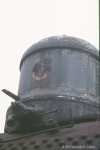 The front sand dome still bears the EBT style number.
The front sand dome still bears the EBT style number.
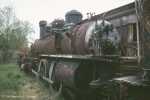 In this view you can see the back head and air pump mount. Below the cab deck is
the air brake reservoir. Notice how much higher the cab deck is from the
tender deck.
In this view you can see the back head and air pump mount. Below the cab deck is
the air brake reservoir. Notice how much higher the cab deck is from the
tender deck.
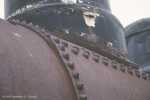 A closeup of the boiler shows the locomotive's Achilles heel. The boiler sheets
are overlapped and riveted together rather than being joined by a narrow plate
riveted to both plates. The result of a lap seam is a slightly uneven distribution
of force on the boiler. The lap seam boiler was made illegal in Indiana during
#6's rebuild, resulting in her current condition. The lagging that would
normally cover the boiler plate has been removed for that rebuild.
A closeup of the boiler shows the locomotive's Achilles heel. The boiler sheets
are overlapped and riveted together rather than being joined by a narrow plate
riveted to both plates. The result of a lap seam is a slightly uneven distribution
of force on the boiler. The lap seam boiler was made illegal in Indiana during
#6's rebuild, resulting in her current condition. The lagging that would
normally cover the boiler plate has been removed for that rebuild.
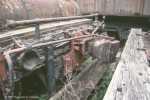 At the rear of the tender is the mounting plate for couplers, one position for
standard and two for 3/4 size. This rear beam represents the general condition
of her wood parts.
At the rear of the tender is the mounting plate for couplers, one position for
standard and two for 3/4 size. This rear beam represents the general condition
of her wood parts.
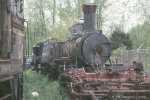 #6 still has her number and builder's plates, which are deteriorating.
Most of her wood components are rotted out. Her boiler
is not in good shape but her frame seems solid.
#6 still has her number and builder's plates, which are deteriorating.
Most of her wood components are rotted out. Her boiler
is not in good shape but her frame seems solid.
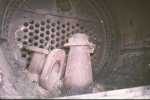 Interior of the Smokebox. The flues are stored in the tender.
Interior of the Smokebox. The flues are stored in the tender.
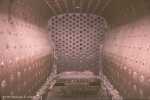 Interior of the firebox as seen through the firebox door. The grates were
nowhere to be seen. The narrow bottom of the box is so that it can fit
between the rear set of drivers, a feature that made such locos harder to
steam. Later EBT locos had wider fireboxes set behind the drivers.
Interior of the firebox as seen through the firebox door. The grates were
nowhere to be seen. The narrow bottom of the box is so that it can fit
between the rear set of drivers, a feature that made such locos harder to
steam. Later EBT locos had wider fireboxes set behind the drivers.
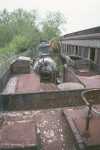 Looking at the boiler from the tender deck, we see the boiler flues stacked
in the tender.
Looking at the boiler from the tender deck, we see the boiler flues stacked
in the tender.
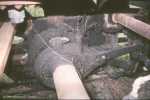 This is her inside-frame crank linking to rocker arms transferring
the motion out to the valves. This was known as a Stephenson valve gear.
All other extant EBT locos have the more modern eccentric crank outside the
frame, with Walschaert or Southern valve gear.
This is her inside-frame crank linking to rocker arms transferring
the motion out to the valves. This was known as a Stephenson valve gear.
All other extant EBT locos have the more modern eccentric crank outside the
frame, with Walschaert or Southern valve gear.
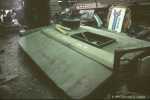 A courteous Whitewater Valley volunteer showed me the replacement cab fabricated
for #6 but never applied.
A courteous Whitewater Valley volunteer showed me the replacement cab fabricated
for #6 but never applied.
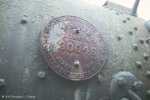 The engineer's side builder's plate shows the locomotive's date and lineage.
It turns out that both the number and builder's plate on the locomotive
are reproductions and the originals are stored inside the building.
The engineer's side builder's plate shows the locomotive's date and lineage.
It turns out that both the number and builder's plate on the locomotive
are reproductions and the originals are stored inside the building.
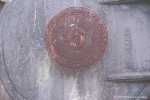 The number plate shows the last vestiges of paint.
The number plate shows the last vestiges of paint.
|
HOME |
The East Broad Top Railroad Homepage © 1994-2003 Christopher D. Coleman All rights reserved Site Information Top of this page |
|---|